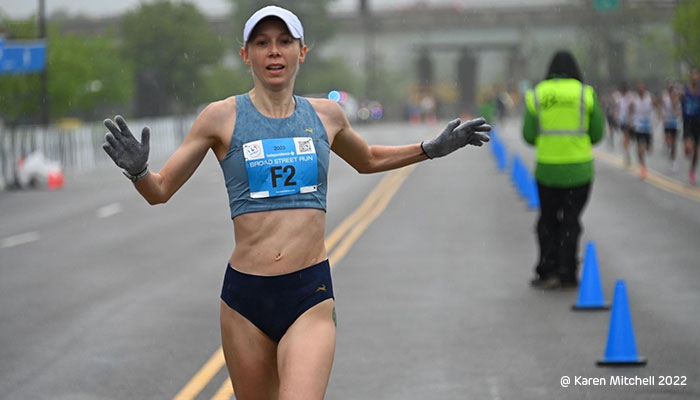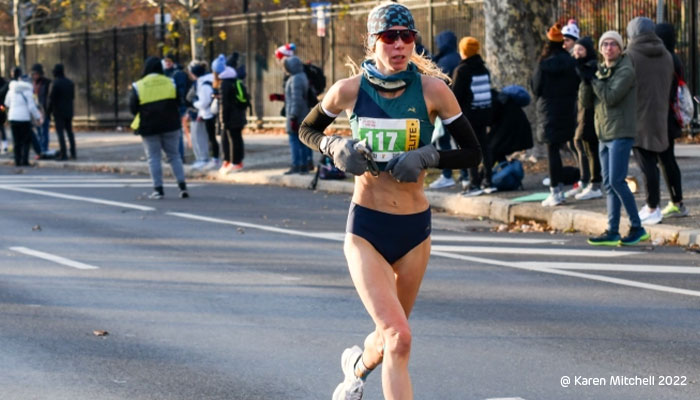HOW CAN WE HELP YOU? Call 1-800-TRY-CHOP
In This Section
A Marathoner Races Toward the Paris Olympics

Amber Zimmerman, PhD, crossed the finish line as the first female runner in the 2022 Philadelphia Marathon. (Credit: Karen Mitchell)
Amber Zimmerman, PhD, cannot remember the last morning she didn't go for a run. Maybe it was sometime in early 2020, before the pandemic locked her into a daily routine: She wakes up around 4:30 a.m., laces her sneakers, and is out the door by 5:30. Whether in rain, sleet, or humidity, she runs 12 to 15 miles every day, usually through Philadelphia's hilly Belmont neighborhood, while listening to science podcasts.
The morning after Dr. Zimmerman won the 2022 Philadelphia Marathon — on a frigid November day — she forced herself to walk her typical training route. The next day, she was back to running.
"I don't even think about it, like, 'Oh, I have to run today.' I just do it," said Dr. Zimmerman, a postdoctoral fellow in the Division of Human Genetics at Children's Hospital of Philadelphia, where she studies the genetic underpinnings of sleep disorders. "I can't imagine not doing it."
Dr. Zimmerman is mentored by Struan Grant, PhD, in the Center for Spatial and Functional Genomics at CHOP and by Allan Pack, PhD, in the Division of Sleep Medicine at the University of Pennsylvania.
Though she is currently among the top 40 fastest female marathon runners in the United States, Dr. Zimmerman insists that running is "just a hobby." When she talks about her favorite activity (sleep is a close second), there is no trace of arrogance that one might expect from an elite athlete. She has no coach and is not part of a running team. She has only competed in four marathons.
Now, Dr. Zimmerman has her eye on the most important race of her lifetime: the 2024 Summer Olympics in Paris.

In the 2023 Broad Street Run, Dr. Zimmerman placed second overall, was the top American, and set the American course record in 52:15. (Credit: Karen Mitchell)
She thinks her "no-days-off" attitude will prepare her well for the U.S. Olympic Team Trials in Orlando, where temperatures can reach 80 degrees with humidity in February. Her training focuses less on speed and more on adaptability — she's ready to take on "whatever the day gives" her.
"In Philadelphia, you get to run in this disgusting summer humidity," Dr. Zimmerman said. "And since I'm not as fast as the fastest women, the unfavorable conditions slow them down a bit."
In Orlando, Dr. Zimmerman will need to place in the top three female finishers. Her chances of making it to the Olympics?
"I think it will take a miracle on the day, but I'm not opposed to miracles," she said.
Breaking Into Marathons

Dr. Zimmerman started running at 7 years old. (Courtesy of Amber Zimmerman)
Dr. Zimmerman spent most of her childhood in Tennessee and started running when she was 7 years old, following in the footsteps of her father and brother. She went on to earn a small scholarship and a place on the track and cross-country teams at the University of Tennessee, where she graduated in three years.
She then earned additional undergraduate degrees at the University of New Mexico, where she continued to race, but eventually "burned out" on collegiate running. She stayed in New Mexico for a doctorate program in neuroscience and tried trail racing for the first time. She also competed professionally in triathlons during graduate school, but she found the world of trail running more fun, laid back, and inviting.
In 2018, she competed in her first marathon, the California International Marathon, and finished in 2:45:54 — not fast enough to qualify for the Olympic Trials.
Consistency and Dedication

Dr. Zimmerman placed second overall in the U.S. Snowshoe National Championships in Leadville, Colorado in 2020. (Courtesy of Amber Zimmerman)
Dr. Zimmerman was motivated to continue racing toward the Olympics, but she started to experience chronic, debilitating headaches. An imaging scan showed that part of her skull was smaller than normal, which was pushing her brain into her spinal canal — a condition called a Chiari malformation. Running, for the foreseeable future, was put on the backburner.
Then came March 2020. Buildings at the University of New Mexico shut down. But Dr. Zimmerman, like many scientists in the early days of the pandemic, did not want to risk losing years of carefully constructed experiments. So, she started waking up before dawn to sneak into her laboratory before anyone was on campus.
How did she get there? Well, she ran, of course.
Soon, her early morning runs to work became a routine. In November 2020, she started "Marathon Mondays" — a personal challenge to run 26.2 miles at the start of every week. She maintains that "there is nothing more rewarding than finishing a marathon before anyone else is awake."
In 2021, Dr. Zimmerman was accepted into her postdoctoral fellowship program and moved to Philadelphia. That year, she competed in the Boston Marathon and the Houston Marathon. With a time of 2:36:26 in Houston, she finished 17th and qualified for the Summer 2024 Olympic Trials.
In November 2022, she raced in the "coldest Philadelphia Marathon since 1994," according to The Philadelphia Inquirer. Racing through Manayunk, Dr. Zimmerman started to run out of steam, and by the time she reached the final five miles down Kelly Drive, she says she "wanted to die."
Yet, she prevailed. She crossed the finish line at 2:31:35 — a personal best time, which earned her the day's top prize in the women's race. To the delight of spectators, a Philadelphian had won the Philadelphia Marathon.

It was a frigid November race day, but Dr. Zimmerman completed the Philadelphia Marathon in 2:31:35 — a personal best time. (Credit: Karen Mitchell)
"It was amazing," she said.
As Dr. Zimmerman trains for the Olympic Trials, she remains consistent and dedicated — two attributes that have made her an exceptional runner, and, in turn, an exceptional scientist.
"I'm kind of obsessive in both realms, so I think each of them feeds the other," she said. "Running has helped me with time management, which has made me a much better scientist. And being a scientist has helped me approach running with curiosity. Being someone who questions everything and constantly pushes myself has helped shape how I train and how I live my life."
Dr. Zimmerman said that establishing a running routine has also been one of the best things she personally has done for her mental health. Her advice for non-runners?
Just do it.
"You do have the time if you prioritize it; you just have to start," Dr. Zimmerman said. "It doesn't matter if you do 10 minutes a day, or two hours."


